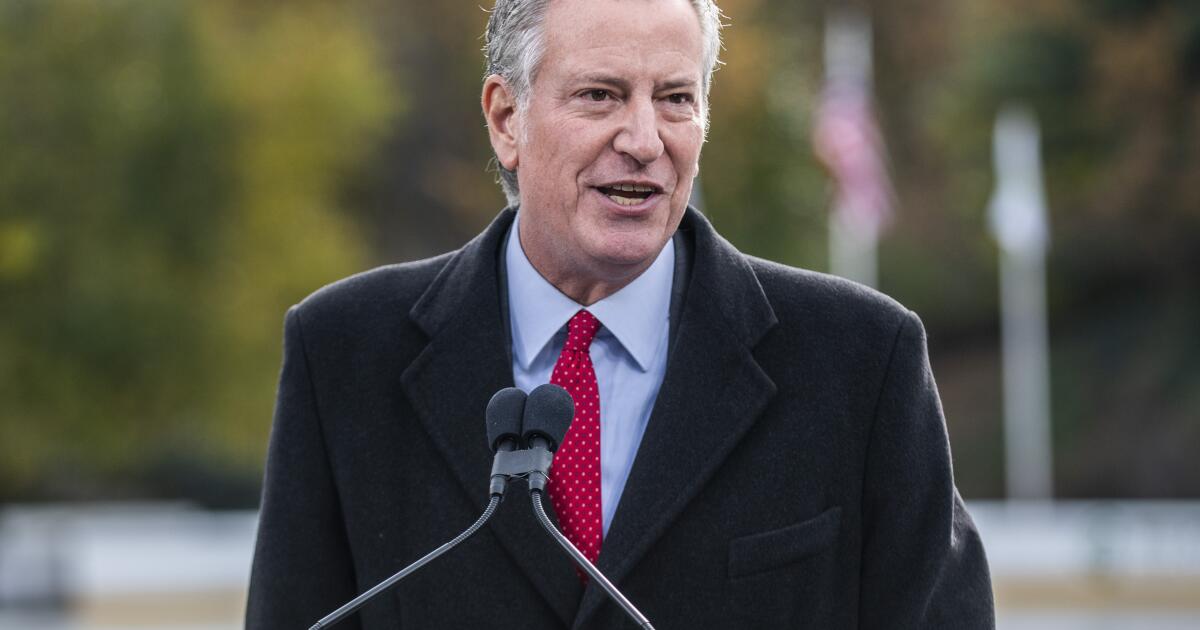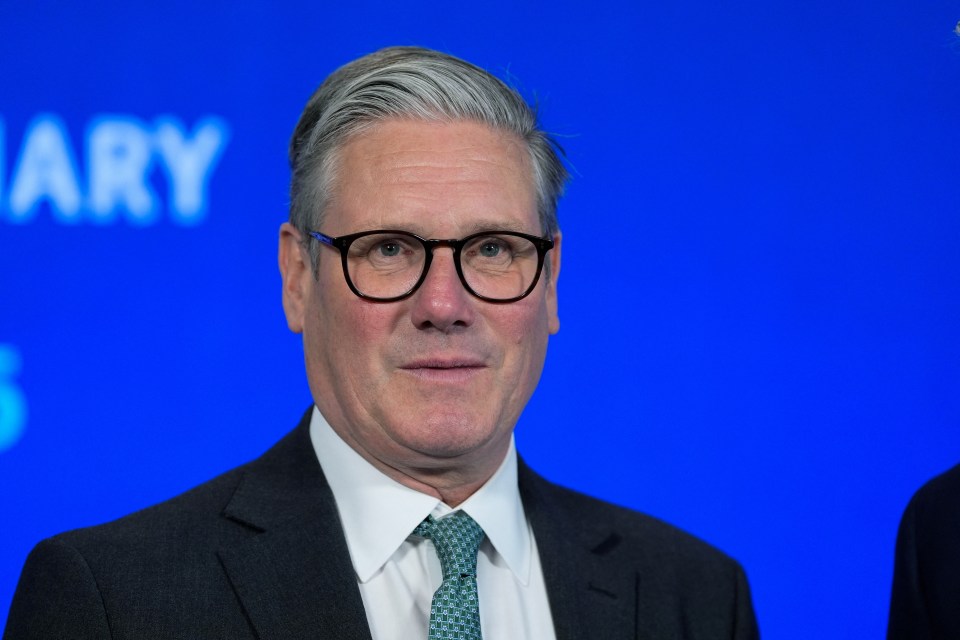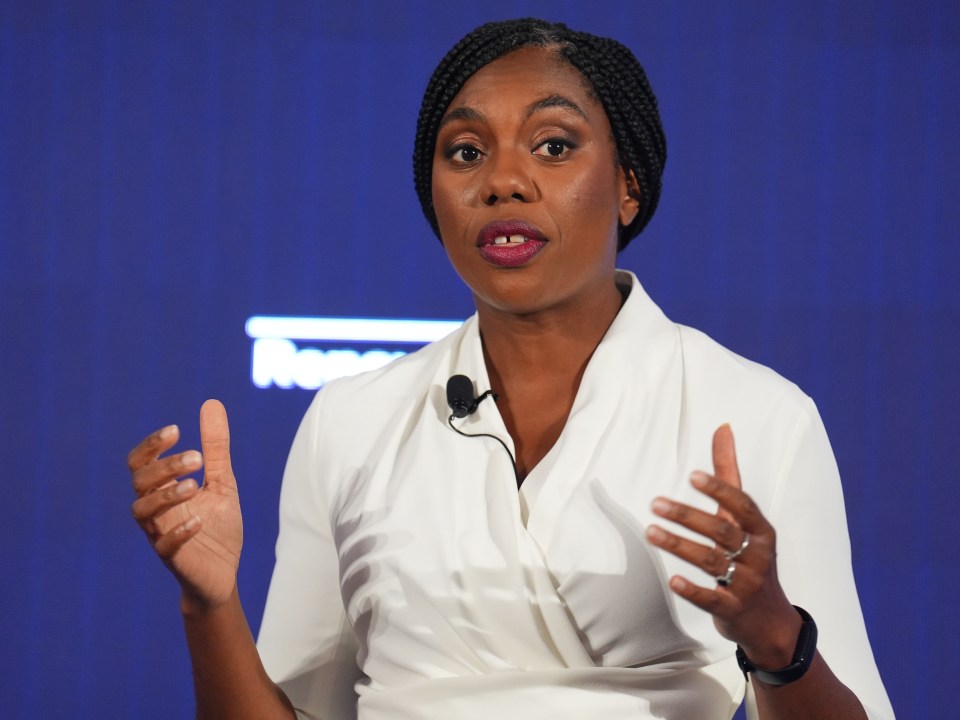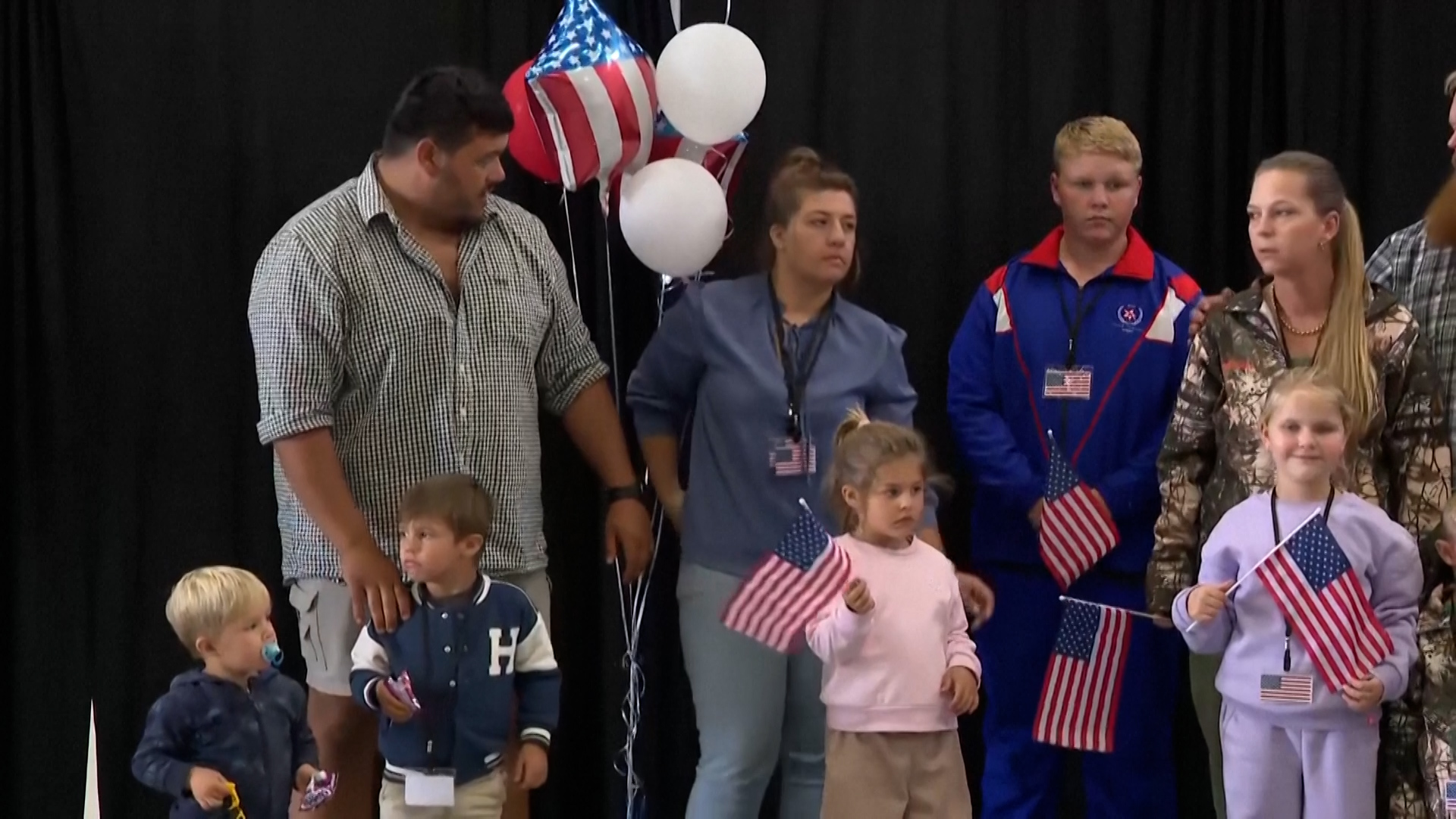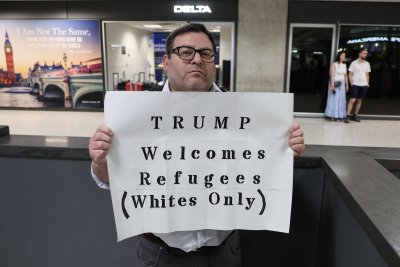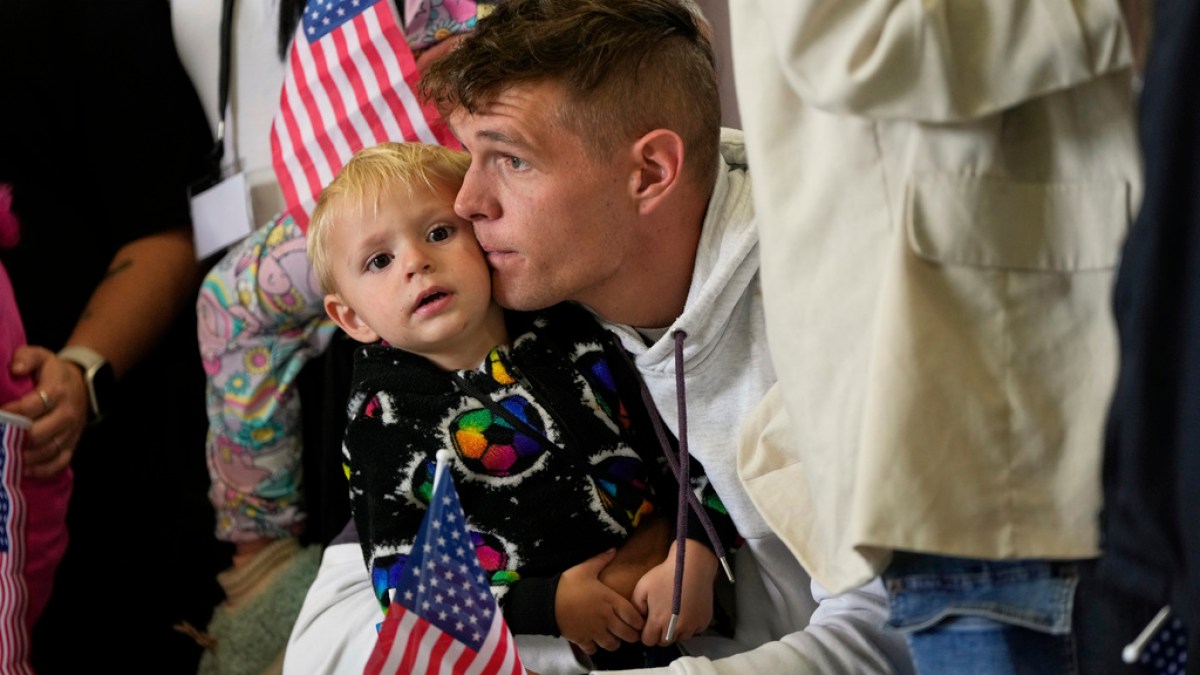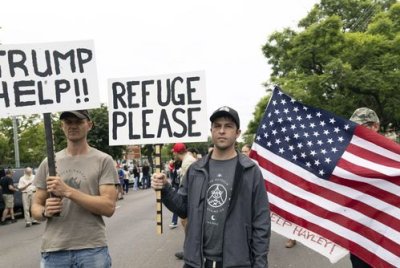‘They’ll be back’: White Afrikaners leave South Africa to be refugees in US | Politics News
Johannesburg, South Africa – On a chilly Sunday evening in Johannesburg, OR Tambo International Airport was filled with tourists and travellers entering and exiting South Africa’s busiest airport.
On one side of the international departures hall, a few dozen people queued – their trollies piled with luggage, travel pillows and children’s blankets – as they waited to board a charter flight to Washington Dulles International Airport in the United States.
Dressed casually and comfortably for the 13-hour journey that would follow, the group – most young, all white – talked among themselves while avoiding onlookers. Although they blended into the bustling terminal around them, these weren’t ordinary travellers. They were Afrikaners leaving South Africa to be refugees in Donald Trump’s America.
When Charl Kleinhaus first applied for refugee resettlement in the US earlier this year, he told officials he had been threatened and that people attempted to claim his property.
The 46-year-old, who claimed to own a farm in Limpopo, South Africa’s northernmost province, was not required to present proof of these threats or provide details regarding when the alleged incidents occurred.
On Sunday, he joined dozens of others accepted by the Trump administration as part of a pilot programme granting asylum to people from the Afrikaner community – descendants of mainly Dutch colonisers that led the brutal apartheid regime for nearly five decades.
The Trump administration claims white people face discrimination in South Africa – a country where they make up some 7 percent of the population but own more than 70 percent of the land and occupy the majority of top management positions.
“I want you all to know that you are really welcome here and that we respect what you have had to deal with these last few years,” US Deputy Secretary of State Christopher Landau told Kleinhaus and the others when they landed at the Dulles International in Virginia.
“We respect the long tradition of your people and what you have accomplished over the years,” he said on Monday.
Speaking to a journalist at the airport, Kleinhaus said he never expected “this land expropriation thing to go so far” in South Africa.
He was referring to the recently passed Expropriation Act, which allows the South African government to, in exceptional circumstances, take land for public use without compensation. Pretoria says the measure is aimed at redressing apartheid injustices, as Black South Africans who make up more than 80 percent of the population still own just 4 percent of the land.
South African officials say the law has not resulted in any land grabs. There is also no record of Kleinhaus’s property being expropriated.
Kleinhaus was unaffected by any threats and the government was unaware of anyone who might have threatened his property, Minister in the Presidency Khumbudzo Ntshavheni told Al Jazeera.
“The people of South Africa have not been affected by the expropriation of land. There’s no evidence. None of them are affected by any farm murders either,” the minister emphasised.
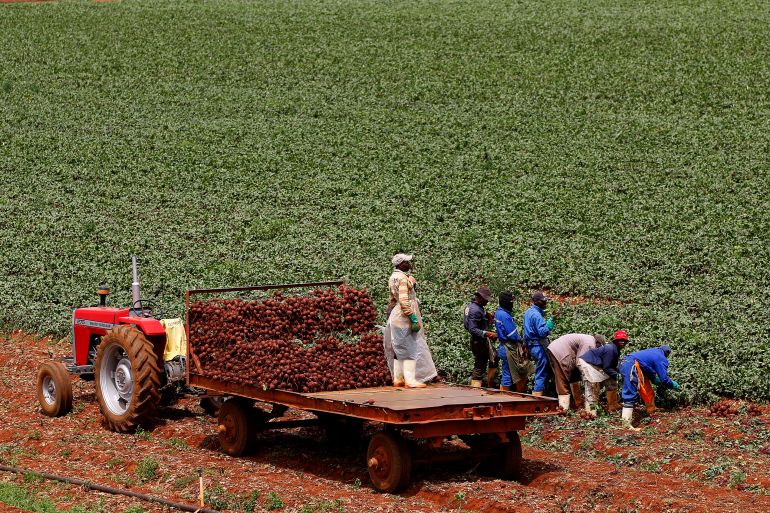
Discredited ‘genocide’ claims
In February, when Trump signed an executive order granting refugee status to Afrikaners, he cited widely discredited claims that their land was being seized and that they were being brutally killed in South Africa.
On Monday, Trump again claimed that Afrikaners were victims of a “genocide” – an accusation South African President Cyril Ramaphosa and other experts maintain is based on lies.
“Farmers are being killed,” Trump told reporters. “White farmers are being brutally killed, and the land is being confiscated in South Africa.”
Ramaphosa has also debunked claims that the group who left this week faced any persecution at home.
“They are leaving because they do not wish to embrace the democratic transformation unfolding in South Africa,” he said.
For 60-year-old Sam Busa, watching Kleinhaus and the 48 other South Africans leave to be resettled in the US was a hopeful moment.
Busa, who has also applied for asylum, is waiting in anticipation for an interview that would qualify her for resettlement. She has begun selling excess household items in anticipation of her new life in the US.
The semi-retired businesswoman has been at the forefront of efforts – through a website called Amerikaners – encouraging Afrikaners to take an interest in the US offer to grant refugee status on the grounds that they face racial persecution in South Africa.
When asked how she has experienced persecution because of her race, Busa recounted an incident where she was held at gunpoint at her home in Johannesburg – the commercial capital of South Africa and one of the most dangerous cities in the world.
She later moved to KwaZulu-Natal on the country’s east coast, where she ran a business that provided services to the government.
When asked whether she believed she was targeted because of her race or if she was simply a victim of common crime, Busa asserted it did not matter.
She didn’t feel safe, she said. “I am not overly sensitive. When I watch Julius Malema singing about killing the Boer, it is extremely terrifying.”
Malema, the far-left leader of the Economic Freedom Fighters (EFF) political party, often sings a famous anti-apartheid song, Kill the Boer (Boer meaning farmer in Afrikaans), which the courts have ruled is not hate speech or an incitement to violence.
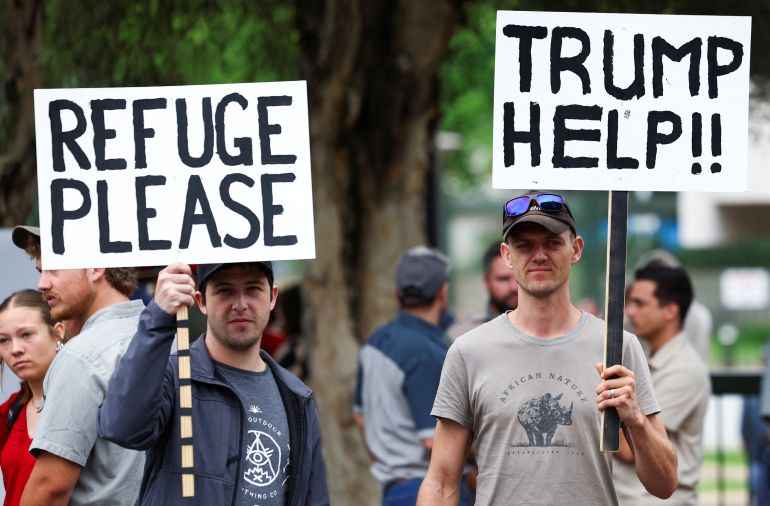
‘Persecution’
For Busa, much like Kleinhaus, new legislation passed to bolster racial transformation, which includes having specific hiring targets for employment equity, has been “the straw that broke the camel’s back”.
“Expropriation without compensation is a huge issue, along with the amendment to employment equity,” she said, restating her belief that white people don’t have a future in South Africa.
“It’s coming hard and fast, and it’s becoming clear to [white] South Africans that we struggle with fears of home invasion. I don’t live on a farm, but there are massive fears because of the constant threat of crime. It has become clear to white South Africans; it’s not disguised,” she claimed.
The narrative of fear is prevalent among those engaged in the refugee programme despite the fact that several experts have debunked the assertion that they were victims of racially motivated attacks and not common crime.
South Africa sees about 19,000 murders a year. According to data from the police, most victims of rural crime are Black, with evidence showing that white farmers are not disproportionately being killed.
Meanwhile, many participants in the US’s Afrikaner refugee resettlement programme do not even live on farms; many are urban dwellers, according to Minister Ntshavheni.
Katia Beedan, who lives in Cape Town, is also anticipating resettlement in the US. She told Al Jazeera that refugee hopefuls do not have to prove racial persecution but simply articulate it.
“For me, it’s racial persecution and political persecution,” she said about her reasons for wanting to leave South Africa.
The copywriter-turned-life coach pointed to racial transformation laws targeting employment equity and land expropriation, which she believes the government is “overwhelming us with”, as a key reason for her desire to flee.
However, many other South Africans see sections of the Afrikaner community – including their right-wing lobby groups like AfriForum that first pushed the false narrative of a “white genocide” – as struggling to exist equally in a country where they were once considered superior because of their race.
“I think AfriForum is struggling with the reality of being ordinary,” social justice activist and South Africa’s former public protector, Thuli Madonsela, told local TV channel, Newzroom Afrika, in March.
“The new South Africa requires all of us to be ordinary, whereas colonialism and apartheid made white people special people.
“I think some white people … [are] seeking to reverse the wheel and find reason to be special again. They seem to have found an ally in the American president,” she said.

‘Absurd and ridiculous’
In February, as Trump expedited efforts to resettle Afrikaners in the US, he was closing off his country’s refugee programme to other asylum seekers from war-torn and famine-stricken parts of the world.
For Loren Landau from the African Centre for Migration and Society at the University of the Witwatersrand in Johannesburg, the Afrikaner refugee relocation is “absurd and ridiculous”.
“They have not been welcomed as tourists or work permit holders, but as refugees. The idea of a refugee system is to protect those who cannot be safeguarded by their own states and who fear persecution or violence because of who they are or their membership in a social group. Can Afrikaners make that case?” he asked.
Although “there are people in South Africa who discriminate against them,” and Afrikaners now “have less privilege and protection than during the apartheid era”, it cannot be said that this is indicative of state policy, he said, adding that many different people are robbed, killed, and face discrimination in South Africa.
“Are they [Afrikaners] specially victimised because of who they are? Absolutely not!” Landau added.
He said all statistics on land ownership, income, and education levels indicate that South Africa’s white population far outstrips others: “They are still by far in the top strata of South African society. No one is taking their land. No one is taking their cars.”
Even fringe groups that may have called for land grabs have done little to enact their threats, observers note.
However, for Busa, that doesn’t matter. “I fear for my children. You never know when the EFF decides they want you dead. It’s not a country I want to live in,” she said. The EFF has said those who decide to leave South Africa should have their citizenship revoked.
Confronted with the implications of this situation, the government is considering whether those who exit as refugees could easily return to the country. Ramaphosa is expected to discuss the ongoing matter with Trump at a meeting in the US next week.
Meanwhile, for the Afrikaners now in the US, most will settle in Texas, with others in New York, Idaho, Iowa and North Carolina, while the government helps them find work and accommodation.
They will hold refugee status for one year, after which they can apply for a US green card to make them permanent residents. At the same time, the Afrikaner resettlement programme remains open to others who want to apply.
When Kleinhaus and his group arrived in the US on Monday, they had smiles on their faces as they met officials and waved US flags.
Yet, for South Africa’s president, their resettlement in the US marks “a sad moment for them” – and something he believes may not last.
“As South Africans, we are resilient. We don’t run away from our problems,” he said at an agricultural exhibition in Free State province on Monday.
“If you look at all national groups in our country, Black and white, they’ve stayed in this country because it’s our country.
“I can bet you that they [the Afrikaners who left] will be back soon because there is no country like South Africa.”

